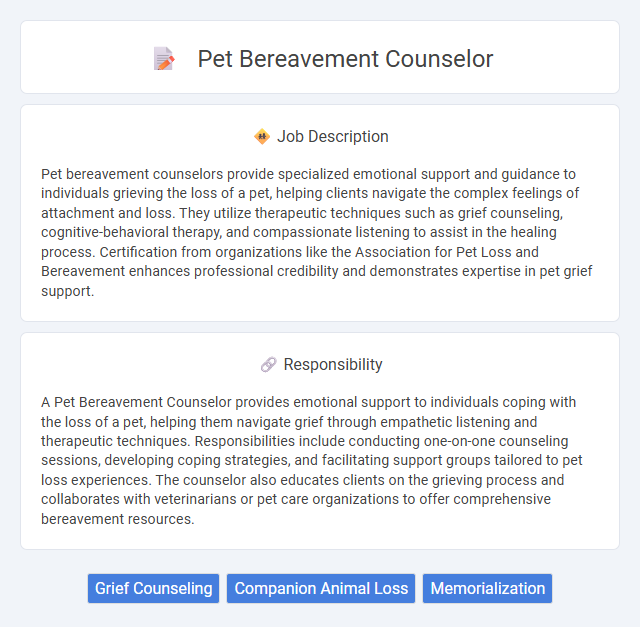
Pet bereavement counselors provide specialized emotional support and guidance to individuals grieving the loss of a pet, helping clients navigate the complex feelings of attachment and loss. They utilize therapeutic techniques such as grief counseling, cognitive-behavioral therapy, and compassionate listening to assist in the healing process. Certification from organizations like the Association for Pet Loss and Bereavement enhances professional credibility and demonstrates expertise in pet grief support.
Individuals experiencing profound grief and emotional distress from the loss of a pet may find a pet bereavement counselor role suitable if they possess strong empathy and effective communication skills. Those likely to thrive in this position tend to handle emotional challenges well and maintain professional boundaries despite the sensitive nature of the work. It seems less suitable for people who struggle with managing intense emotions or lack the ability to support others through grief processes.
Qualification
A Pet Bereavement Counselor typically requires a background in psychology, counseling, or social work, often holding a bachelor's or master's degree in these fields. Specialized training in grief counseling, particularly related to pet loss, is essential to address the unique emotional challenges faced by clients. Certification from recognized bodies, such as the Association of Pet Loss and Bereavement (APLB), enhances credibility and demonstrates expertise in this niche counseling area.
Responsibility
A Pet Bereavement Counselor provides emotional support to individuals coping with the loss of a pet, helping them navigate grief through empathetic listening and therapeutic techniques. Responsibilities include conducting one-on-one counseling sessions, developing coping strategies, and facilitating support groups tailored to pet loss experiences. The counselor also educates clients on the grieving process and collaborates with veterinarians or pet care organizations to offer comprehensive bereavement resources.
Benefit
Pet bereavement counselors likely provide critical emotional support to individuals coping with the loss of a pet, improving their mental well-being and aiding in the healing process. This role may offer the satisfaction of making a meaningful impact on clients' lives during difficult times. Opportunities for personal growth and development in grief counseling techniques could be common benefits of this job.
Challenge
Pet bereavement counselors likely face the challenge of managing the intense emotions experienced by clients mourning the loss of a beloved animal. The complexity of grief in this niche may require specialized empathy and communication skills to provide effective support. Balancing professional boundaries while offering compassionate care could often demand significant emotional resilience.
Career Advancement
Pet bereavement counselors can advance their careers by gaining certifications in grief counseling and animal-assisted therapy, enhancing their expertise and credibility. Pursuing advanced degrees in psychology or counseling often opens opportunities to work in specialized clinics or private practice settings. Building a professional network through associations like the Association for Pet Loss and Bereavement supports career growth and access to high-profile roles.
Key Terms
Grief Counseling
Pet bereavement counselors specialize in grief counseling, helping clients navigate the complex emotions following the loss of a beloved animal companion. They employ therapeutic techniques to address feelings of sadness, guilt, and loneliness, promoting emotional healing and coping strategies. Expertise in pet loss support enhances their ability to provide empathetic, individualized care during a profoundly difficult time.
Companion Animal Loss
Pet bereavement counselors specialize in supporting individuals grieving the loss of companion animals, providing empathetic guidance through emotional distress and guilt. They utilize therapeutic techniques such as grief counseling and cognitive-behavioral therapy to assist clients in processing their loss and promoting healing. Expertise in animal-human bond psychology enhances the counselor's ability to address unique aspects of companion animal loss effectively.
Memorialization
Pet bereavement counselors specialize in supporting individuals coping with the loss of a beloved animal companion, guiding them through grief and emotional healing. Memorialization services play a pivotal role in their work, offering personalized rituals, keepsakes, and ceremonies that honor the unique bond between pet and owner. These practices provide lasting comfort and a meaningful tribute, facilitating closure and emotional resilience during the bereavement process.
 kuljobs.com
kuljobs.com